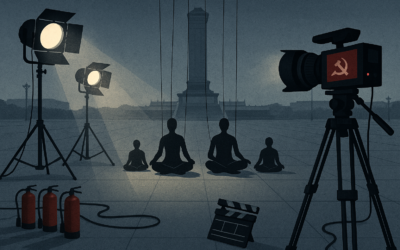The Church of Almighty God is the most persecuted religious movement in China. Its members who are in South Korea should not be deported back there.
by Bitter Winter

Dear President Yoon:
We are scholars of religion and representatives of NGOs concerned about freedom of religion or belief and the dignity of every human being. We believe that these are universal values, and they are under threat. We wholeheartedly concur with your remarks at the June 29, 2022, NATO summit that unfortunately, “a movement that denies the universal values that we have been protecting” is manifesting itself more and more aggressively throughout the world.
We are particularly concerned about the increasing crackdown in China on all religions. The U.S. Department of State Annual Report 2022 on Religious Freedom graphically described how in China in 2021 “the government tortured, physically abused, arrested, disappeared, detained, sentenced to prison, subjected to forced labor and forced indoctrination in CCP [Chinese Communist Party] ideology, and harassed adherents of both registered and unregistered religious groups for activities related to their religious beliefs and practices.”
The same report mentions that “in the context of the 100th anniversary of the CCP’s founding, the government ordered increased arrests for members of all dissident groups, particularly CAG [Church of Almighty God] members.” The report by the U.S. State Department makes it abundantly clear that being an active member of the CAG is enough in China to be “arrested, pressured to sign statements renouncing their faith, and being subject to psychological and physical abuse,” including documented instances of torture and extra-judicial killing. In the subtitle of a book written by one of the signatories of this letter and published by the leading academic published Oxford University Press in 2020 (Massimo Introvigne, “Inside The Church of Almighty God”), the CAG is described as “the most persecuted religious movement in China.”
The CAG is a large Chinese Christian new religious movement, which believes that Jesus Christ has returned to Earth in the shape of a Chinese woman currently living abroad. Irrespective of its theology, we believe that the CAG, as any other religion, has the right to freely profess its faith.
Obviously, in front of horrific stories of persecution and torture, we have asked ourselves what can be done to help CAG members. Some of us tried appealing directly to Chinese authorities, but no results were achieved.
There are now more than 5,000 CAG refugees overseas. Happily, in countries such as the United States, Italy, and Germany a significant number of requests for asylum have now been granted. However, in some countries CAG asylum applications are still rejected, due to pressure and fake news spread by Chinese agencies and their fellow travelers, and a local social climate hostile to refugees. We have seen persuasive evidence that CAG members who are compelled to return to China are immediately arrested and sentenced to heavy jail terms, or “disappear” into the deep Chinese concentration camp system, never to reappear.
We are aware of social problems in South Korea that complicate the refugee issue in general. On the other hand, to quote your June speech, “protecting universal values” is what makes our democratic countries a beacon of hope for those who live under the heel of totalitarian regimes.
We reiterate that, whatever their personal past histories, we regard as beyond dispute that any CAG member currently living in South Korea who will be sent back to China will be subject to severe persecution.
We understand that new legislation and administrative procedures, prohibiting or making more difficult repeated asylum applications, may increase both the chances that some 1,000 CAG refugees in South Korea would be deported to China and the corresponding intractable political problems.
If political concerns prevent asylum from being granted, other possible solutions may be explored. Italy, for example, has granted to dozens of CAG refugees, rather than asylum, what Italian law calls “subsidiary protection.” It is a temporary status that allows the asylum seeker to remain in Italy for five years (and for subsequent 5-year periods, by proving that the situation in the home country has not changed). Saipan is also granting temporary permissions to stay there to CAG asylum seekers, who are allowed to remain there for an indefinite period of time. These intermediate solutions avoid the political problems connected both with granting asylum and with deporting CAG members to a country where they will be persecuted, thus shaming the government that ordered them deported.
We are sure that, in the name of the universal values of freedom of religion and protection of the victims of human rights abuses, a solution will be found for the CAG Chinese asylum seekers in South Korea too, and we thank you in advance for what you will personally be able to do in this respect.
Yours sincerely,
Alessandro Amicarelli, FOB, European Federation for Freedom of Belief, London, UK
Eileen Barker, London School of Economics (em.), London, UK
Angela Coco, Southern Cross University, Lismore (NSW), Australia
Raffaella Di Marzio, Center for Studies on Freedom of Religion Belief and Conscience (LIREC), Rome, Italy
Willy Fautré, Human Rights Without Frontiers, Brussels, Belgium
Holly Folk, Western Washington University, Bellingham, Washington
John R. Hall, University of California Davis and Santa Cruz, California
Massimo Introvigne, CESNUR, Center for Studies on New Religions, Torino, Italy
Camelia Marin, Soteria International, Copenhagen, Denmark
J. Gordon Melton, Baylor University, Waco, Texas
Rebecca Moore, San Diego State University, San Diego, California
Timothy Miller, University of Kansas, Kansas
Hans Noot, Gerard Noodt Foundation, Langenboom, The Netherlands
Marco Respinti, Bitter Winter, an international magazine on religious liberty and human rights, Torino, Italy
James T. Richardson, University of Nevada, Reno (em.), Nevada
Bernadette Rigal-Cellard, Université Bordeaux-Montaigne, France
Rosita Šorytė, ORLIR, International Observatory of Religious Liberty of Refugees, Torino, Italy
Thierry Valle, CAP-LC, Coordination des associations et des particuliers pour la liberté de conscience, Paris, France
Catherine Wessinger, Loyola University New Orleans, Louisiana
Peter Zoehrer, FOREF, Forum for Religious Freedom – Europe, Vienna, Austria



